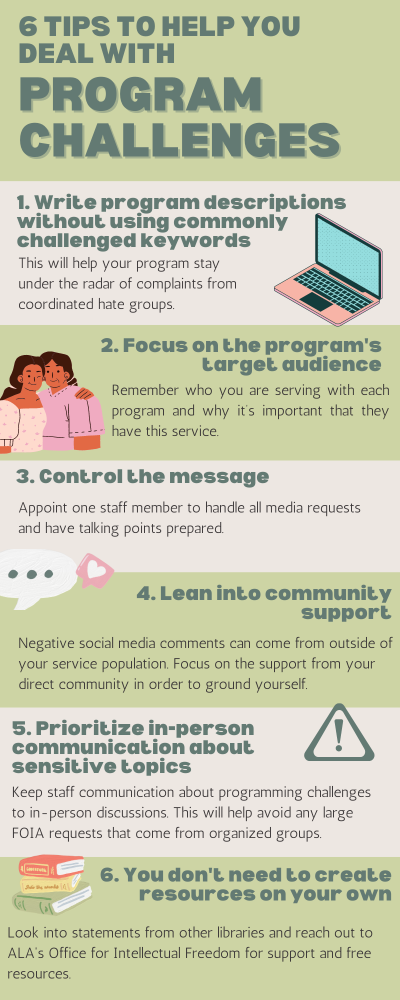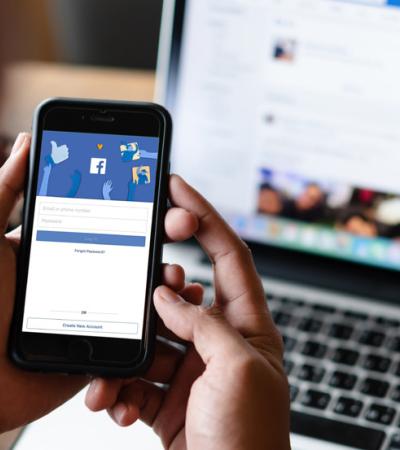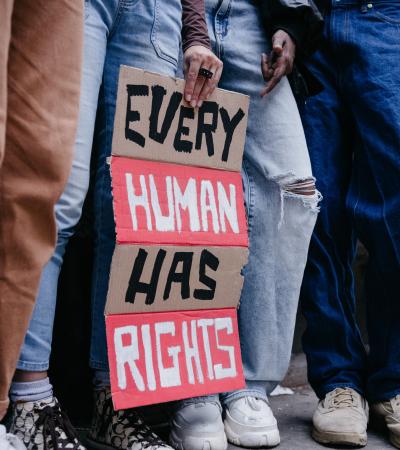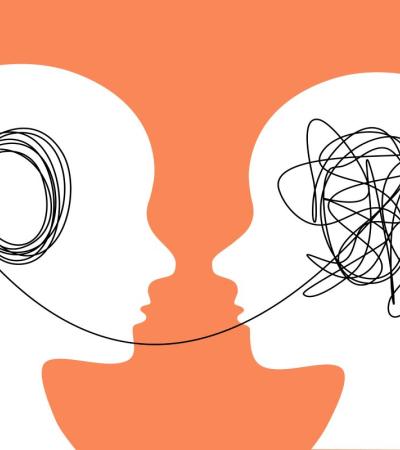Amanda Klenk was looking forward to a fun, successful event hosted by a local drag performer, Aurora Divine. As the teen services coordinator for the Downers Grove (Ill.) Public Library, she strives to connect teens to new experiences in age-appropriate and accessible ways. Klenk’s upcoming Drag Queen Bingo event, designed for teens in seventh through twelfth grade, was scheduled for National Coming Out Day.
The event was turning out to be one of the largest teen programs in her four years programming with the library. The registration list was full and the waitlist was growing.

In August 2022, the program was promoted through the library’s usual outlets — a newsletter sent to homes, a blurb on the website and a published event on the library’s digital calendar. Klenk expected the usual flurry of negative comments that inevitably come along with promoting a program on the internet, but the usual stirring over the weekend turned into a tumultuous Monday morning.
They’re just searching for keywords
The initial feedback focused on how library funds shouldn’t be spent on such a program. Klenk was expecting comments like these. When the emails started to escalate into phone calls and drop-ins, the backlash started interfering with the library’s everyday work. “The comments quickly crossed the line beyond complaints about our professions and into personal attacks,” Klenk says. “It was beyond the scope of anything I had ever dealt with.”
While the main group organizing against Drag Queen Bingo was local to Illinois, many people outside of the direct community found the program through internet searches and social media.
“The first person to screenshot and share the program was from Ohio,” says Cindy Khatri, Downers Grove Public Library’s public relations manager. “They were most likely Googling ‘drag queen library’ with the purpose of finding programs like this. It doesn’t matter where you’re located because the folks with this agenda will likely find your program if you use the words they’re searching for.”
Although there was negative feedback from local community members, many who contacted the library were not patrons of the Downers Grove Public Library.
Khatri says that the library never wants to hide what they are doing or cloak what a program’s purpose is but, in the future, choosing words that aren’t common keywords or “lightning rods” will be helpful to stay under the radar of complaints that come from coordinated hate groups.
Inaccurate reporting led to misinformation
The influx of backlash from Drag Queen Bingo led the library to post a statement addressing the main concerns about the program's content. At the point of posting the statement, the library had no plans to cancel the event. On Sept.12, however, the library was forced to cancel the program when a threatening letter containing a bullet was mailed to the DuPage County Offices. The decision to cancel the program was based on the library not being able “to provide a safe place for everyone due to the threats made,” wrote Julie Milavec, director of the Downers Grove Public Library, in the library’s statement addressing the cancellation.
“There was a lot of misinformation about the letter we received that spiraled out of control,” Khatri says. “People were saying it was planted. The library would never plant something like that. Even outside of the letter, with the threatening emails, social media comments and voicemails — it was enough to make me feel unsafe.”
Misinformation on social media about the program caused even more backlash. “The program's age range quickly spiraled into getting younger and younger,” says Khatri. “The drag performer was also misidentified as being another performer. A lot of people simply didn’t take the time to fact check or look into why we were doing the program and who it was meant for.”
The library’s board meeting on Sept. 28 also led to misinformation about the program and the reasons for the backlash. “The opposition group came to the meeting with an organized game plan,” says Milavec. “They made sure that their people spoke first and hit the same talking points repeatedly until a recess had to be called. At that point, the media left.”
After the recess, many remaining attendees spoke in favor of the library and the program. Unfortunately, no media was left to see the outpourings of patron support.
Control the message
“The sound bites that the media used from the opposition was along the lines of ‘teens don’t want this, the community doesn’t want this, nobody wants this,’” says Khatri.
“But we heard directly from the teenagers who registered for the event about why this was important to them. After that, we focused our communication on who was being affected by this and we re-centered the teens.”
Since finishing up library school in the last ten years, Klenk says that the most transferable information she was taught for this situation was how to deal with book challenges. “We thought we were prepared for some backlash, but this was beyond anything we could have even imagined,” Klenk says. “We’re all learning how to handle this as we go.”
In terms of taking action, the library followed an existing plan in place for crisis situations. “We had to recognize that there is no perfect plan, and you must adapt while responding to what is needed,” says Khatri.
If your library is receiving escalated backlash, Khatri advises appointing one library staff member to handle media requests and control the message. “We had a meeting with staff to get everyone on the same page about the facts of the situation,” Khatri says. “If patrons start asking questions, make sure staff have talking points prepared.”
My office became the crying room
“It’s so hard to read these emails and comments day after day after day,” says Milavec. “The name-calling got intense. We were called groomers, pedophiles and sexual deviants with many of the attacks against me personally as library director.”
The main group organizing against the library is still trying to call for Milavec’s firing, saying she has turned the library into a homeless shelter. “At this point,” Milavec says, “they have moved on from Drag Queen Bingo and are now focusing on baseless claims of ‘lack of safety’ and ‘security’ at the library.”
Khatri explains that it wasn’t just emails and phone calls, but attacks on library staff’s personal social media accounts. “It was relentless,” she says. “It was to the point where we felt we needed someone walking with Julie [Milavec] to the bathroom.”
“My office became the crying room for a bit,” Milavec says. “Once it became clear that this was gearing up to affect us in and outside of work, we needed a safe space for staff to decompress.”
They FOIA’d our personal text messages
The Freedom of Information Act (FOIA) deeply impacted Downers Grove Public Library and how staff communicated about the issue behind the scenes. FOIA requests can provide access to federal agency records. Any written correspondences (emails, memos, meeting records, etc.) that were directly about library business between library staff members were “FOIA’d.”
Know that FOIA requests can happen and be aware of the FOIA laws in your state.
The organization working against the library began inundating staff with FOIA requests. “Along with getting media requests and dealing with constant phone calls and emails, we had to get these FOIA requests completed to meet deadlines,” Milavec says. “They wanted everything from my personal cell phone and other things that they couldn’t even have! But it didn’t stop them from asking for it.”
Once the FOIA requests came in, prioritization of in-person communication became very important. “Personal texts that were directly about library business between library staff was FOIA’d,” Khatri says. “Let that be a reminder to keep communication about sensitive topics in person.”
Lean into community support
How is it that someone from Ohio was able to bring so much backlash to a community they don’t live in? Despite many internet comments posted by people nowhere near the library’s service population, at times it was difficult for staff to see beyond the negativity.
Milavec recounts seeing a parent bring their child to the library for story time and being confused by the news vans in the parking lot, completely unaware of the situation. “Seeing that father was a reminder that okay, right now, it seems like everyone is against us but that’s nowhere near the truth,” she says. “People from the community are still coming in because they still need our services.”
Dig into the data and get the bigger picture, Milavec advises. Doing this was an important grounding exercise for the library staff. When the library began to receive feedback from numerous outlets (email, in-person, phone calls, social media, mailed letters, etc.), creating an Excel sheet that tracked information including the patron’s name, library card number, contact information and comment became essential.
Tracking feedback this way allowed staff to understand the community’s response by being able to sort the types of comments and see how many people supported/opposed the event and were actual patrons or community members. The library found that out of all the submitted feedback, it turned out that around 98% of the Downers Grove population had not sent any feedback, positive or negative, about the program at all.
Despite the media not capturing it, “The community support was amazing,” Klenk says. “It was very moving to see so many people stand up for the library, especially at the board meeting.”
We didn’t change our policies — we are still here
“They succeeded in canceling this one program, but it doesn’t deter us from looking to serve communities that need this representation,” Khatri says.
“We didn’t change our policies, nobody was fired and many community members stood up for us. Outside of the program cancellation, nothing has changed.”
What final pieces of advice do they have for other libraries facing similar backlash? Khatri suggests research sharing with other libraries. “Don’t limit yourself to feeling like you need to create resources on your own,” she suggests. “We looked to statements from other libraries, especially on Drag Queen Story Times.”
Klenk reiterates the importance of refocusing on the program’s target audience. “The people who are pushing back aren’t the people that want or need that program,” she says. “It’s important to remember who you’re serving with each program and why it’s important that they have this.”
They have a playbook
The requests for FOIAs, the constant emails and calls, the search for staff’s personal social media accounts, the takeover of the microphone at the board meeting — all of this is part of a playbook to get library workers as burnt out as possible.
“It’s important to remember that this backlash is nationally organized, not an isolated problem,” Milavec says. “They are following a plan and the goal of that plan is not to stop drag queen library programs, but to ultimately shut us down. They want to shut down public libraries, but we won’t let that happen. I don’t see the Downers Grove Public Library moving away or ever backing down from our equity work. We have a beautifully diverse community that will always be reflected in our library.”
Note: If you are experiencing challenges at your library and need assistance, please reach out to ALA’s Office for Intellectual Freedom at oif@ala.org. ALA’s website on Challenge Preparedness also provides resources for library workers on fighting censorship.



